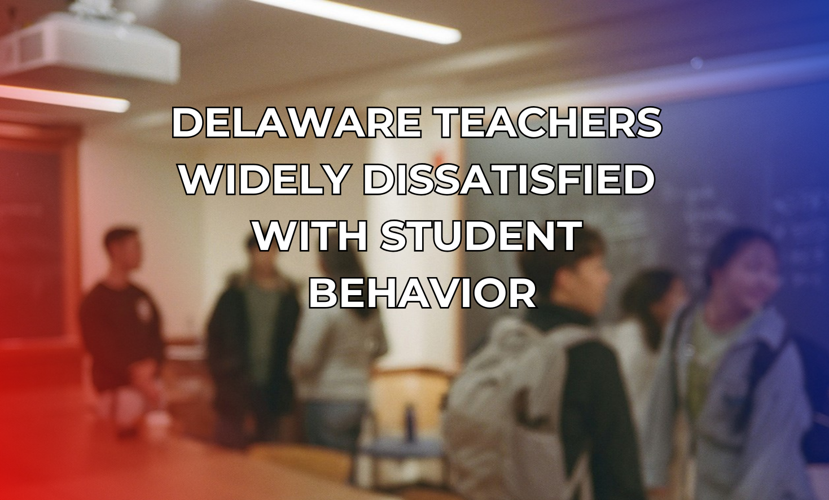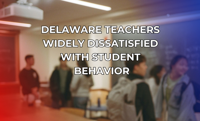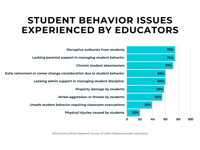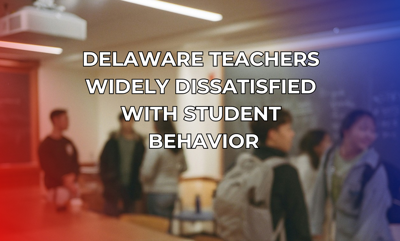DOVER, Del. - Public education may be approaching a tipping point as student behavioral issues that disrupt learning and compromise safety are taking a toll on teachers. A new survey reveals the extent of these challenges, with the majority of educators expressing concerns about student outbursts, violence and a lack of support from state resources, administrators and parents.
Key ideas:
- Nearly 60 percent of educators in Delaware are considering early retirement or a career change due to student behavior challenges.
- Educators call for smaller class sizes, more disciplinary support and increasing involvement from parents.
The survey was conducted by Emma White Research and included interviews with more than 1,000 public educators from July 10 to July 15. Results show that three in five educators say they are more likely to retire early or leave public education for other careers due to student behavioral challenges. Veteran teachers are most likely to quit the profession because of unaddressed issues.
In fact, 75 percent of Delaware State Education Association members who responded to the survey said they've experienced verbal outbursts by students that disrupted learning. Having students who were chronically absent was experienced by 72 percent of teachers. Nearly two in five teachers say they've evacuated classrooms due to unsafe student behavior while 58 percent say they've experienced students damage property, and 20 percent have been physically hurt by a student.

According to an Emma White Research survey shared by the Delaware State Education Association, 60 percent of Delaware educators are considering leaving the profession or retiring early because of student behavior. The majority have experienced disruptive outbursts from students and chronic absenteeism and note a lack in parental support.
"We're at a crisis point in public education that's only going to get worse until administrators, school boards and state legislators take corrective action to restore our schools to the safe and healthy learning environments that students need to be successful," Delaware State Education Association President Stephanie Ingram said in a statement Monday.
School violence has made headlines more than once in the past year or so. A Dover High School student was hurt by a knife during a fight in February, a 14-year-old was arrested on felony assault charges for punching and stomping on another student's head at Lake Forest just before Christmas and multiple people were arrested following a fight right after Sussex Central's 2023 graduation. There was also a fight at Sussex Central in May 2023 that resulted in a lawsuit.
Student behavior is an issue in neighboring Maryland, as well. Last school year, charges were requested for a 14-year-old girl who police say stabbed another student with scissors at Bennett Middle School. At Bennett High, school resource and road patrol deputies pepper sprayed a group of students "brawling" near the school's entrance early one morning. Two staff members were also assaulted just days apart at two separate Talbot County high schools in March.
Ingram went on to identify the need for behavioral health support interventions, some of which have been signed into law recently; Gov. John Carney signed two pieces of legislation on Aug. 7 that should reduce the student-to-counselor ratio for high schools and expand reimbursement for school-based behavioral health services. Ingram said the Delaware State Education Association expects the Student Behavior and School Climate Task Force, which was established this past spring to evaluate the impact of student behavior on students and teacher retention, to recommend meaningful reform in coming weeks.
"Without those changes, instruction time will continue to be lost, which will only contribute to schools missing their proficiency targets and worsen educator burnout," she said. "That, in turn, leads to mass vacancies, which only makes the problem worse for the educators who remain. And on and on we go with educators fielding most of the blame instead of getting the support and resources they need."
A survey similar to this year's Emma White Research one was completed at the end of 2023. It found that 70 percent of educators were dissatisfied with their working conditions, with more than 95 percent saying they were concerned about stress, burnout, staffing shortages and student behavior.
The 2024 Emma White Research survey follows the August release of disappointing data on Delaware students' testing and proficiency scores. While 2024 standardized test scores showed some improvement from the prior year, just 18 percent of high school students were deemed proficient or higher in math based on SAT scores. Declines were also noted in essay writing.
Survey responses from teachers corroborate the testing results; rather than focusing on classroom instruction, the average public school teacher in Delaware is now spending seven hours a month, nearly one full school day, managing student behavior. Middle school teachers lose closer to 10 hours of instruction time per month.
Educators were clear in what steps could be taken that they feel would address behavior issues. Smaller class sizes were noted by 95 percent of teachers. According to the 2024-2025 school year capacity reports, 43 schools in Delaware are at or above 100 percent capacity. The worst was North Dover Elementary at 136 percent. Of the seven elementary schools in the Capital School District, five are over capacity, and the district even considered going remote last spring due to the staffing shortage.

Nearly all educators favor having smaller class sizes and say support from administrators and parents could improve student behavior. Also noted was the implementation of a building- or district-wide cell phone policy.
Additional solutions included better disciplinary support from administrators at 93 percent of respondents, more co-teachers in classrooms with larger numbers of high-need students at 91 percent and better administrative communication with parents at 90 percent.
Though additional funding and resources are often a common plea from those working in education, nearly half have said students are still not getting the mental health support they need despite recent funding increases for school mental health workers, according to the survey. Calls on parents to get involved have increased in recent years on social media, and are now shown in survey results, too. More than 75 percent of educators report a lack of parental support in dealing with student discipline while 60 percent say they lack support from school administrators.
The Student Behavior and School Climate Task Force meets Sept. 16 at 4 p.m. in a virtual hybrid meeting to discuss survey results. Upcoming meetings are also set for Oct. 7 and Oct. 28.













